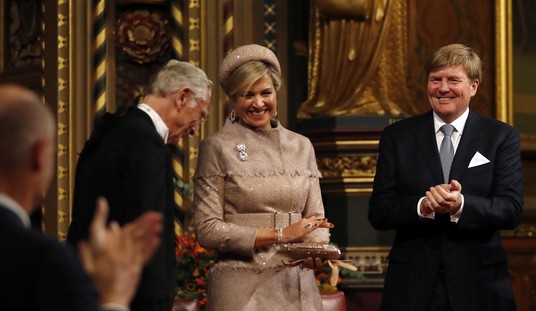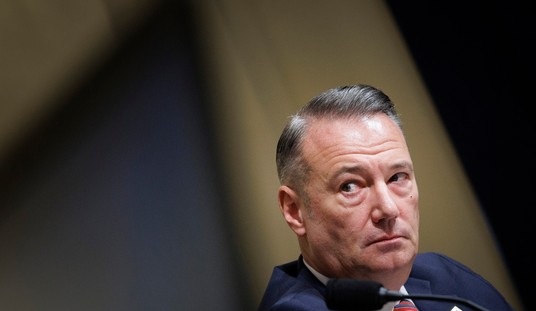“For a woman to come forward in the glaring lights of focus, nationally,” said one famous politician, “you’ve got to start off with the presumption that at least the essence of what she’s talking about is real.” That declaration came from Joe Biden, who said it to reporters during the Brett Kavanaugh hearings. Now one of Biden’s former staffers has come forward in the glaring light of a presidential campaign to accuse Biden of sexual assault when she worked in his Senate office.
The accuser, Tara Reade, first levied an accusation of inappropriate behavior almost a year ago, but Reade only specified that Biden “put his hand on my shoulder and run his finger up my neck.” Now, however, Reade accuses Biden of having digitally penetrated her vagina in a disgusting encounter in the capital. After first making the accusation with Rolling Stone reporter Katie Halper in a Soundcloud interview, Reade told the same story on The Hill’s podcast:
“And he had me against the wall,” Reade continued. “And then his hands were down my skirt and up my skirt. And I was wearing–I wasn’t wearing anything underneath. And then, with his hand, he went from there and entered me–with his hand–and as he was trying to kiss me, and saying things to me.”
“Everything kind of happened at once but there were incremental parts to it,” she added during her Rising interview.
Reade then described the alleged immediate aftermath:
He was trying to kiss me, and I was pulling away. And what I remember of that time is feeling really shocked and surprised because there was no real conversation right beforehand. There was no precursor. It just happened. And then, when he did that, I was obviously pulling away. And he pulled back and said, you know, ‘Come on man, I heard you liked me,’ something to that effect. And that’s what kind of jolted me–I was trying to think what I did wrong to bring that on to me. He looked angry and irritated with me.
“And I–that’s when I knew it was really–I was in a very difficult position because he was my boss and he was like my dad’s age at the time. And I trusted him. I looked up to him. And I–it was not like I disliked him. I liked him but I just didn’t like him in that way. It was just shocking. It was shattering, actually. And he said to me, when he pulled back, he pointed his finger at me, he said, ‘You’re nothing to me. You’re nothing.’ And he straightened his clothes and he went away.”
Hoo boy. On one hand, this has to be treated with at least some level of skepticism. Not only did Reade not tell this story publicly at the the time, she withheld this particular accusation at the same time she went public with her other harassment claims against Biden last year. Reade explains why she didn’t tell everything at that time and does so fairly well, but it’s not entirely convincing either. Especially in the wake of #MeToo and the Kavanaugh hearings the year before, why didn’t Reade lead with the sexual assault claim in April 2019?
The timing is troublesome in another way. Democrats are beginning to panic about Biden’s performance and behavior on the campaign trail, but now that he’s gotten a commanding lead in delegates, there’s no way to get him off the ticket. A #MeToo accusation at this point might be an awfully convenient way to push Biden out of the nomination and for the Democratic Party establishment to draft someone else — Andrew Cuomo, perhaps, whose star is definitely soaring at the moment.
On the other hand, Biden’s creepiness around young women has been repeatedly noted. It has often been captured on film and video and was such a concern that Biden had to specifically pledge to improve in a prepared campaign statement last April. Several other women came forward with Reade shortly before that to accuse Biden of inappropriate physical contact at different times, including a former lieutenant governor candidate in Nevada, Lucy Flores. The “come on man, I heard you liked me” has the authentic ring of Biden’s voice to it, too.
Moreover, unlike Kavanaugh’s accusers, Reade’s connection to Biden is well established. She told others contemporaneous to the alleged assault about it, and they corroborate that much of her story. That’s far more than anything produced against Kavanaugh, whom Biden publicly condemned. As Robby Soave wrote yesterday at Reason, Biden’s own standards in the Kavanaugh case would convict him immediately:
Barring the emergence of some really credible documentation, it’s going to be nearly impossible to informally adjudicate—formal adjudication being absolutely impossible—the accusation. Too much time has passed.
On the other hand, the very recent precedent set by the mainstream media and mainstream liberals during the Kavanaugh episode is that all accusations should be revisited, no matter how old. Indeed, one could make a better argument for considering Reade’s accusation than Blasey Ford’s: the latter concerns behavior that occurred during the accused person’s teenage years in the early 1980s, whereas Biden allegedly committed his transgression while a sitting U.S. senator. And again, Biden himself has taken the position that we should believe women even if it takes them a very, very long time to come forward.
It seems unlikely the Reade accusation can sink Biden’s candidacy, but whether Democratic primary voters and the mainstream media are willing to air it out as they did Kavanaugh’s will tell us a lot about what “believe all women” actually means.
It certainly tells us what hypocrisy means. Reade’s accusation has more specificity, her connection to her alleged assaulter much more well established, and the accused has a long history of inappropriate behavior and touching around women. If Biden was a Republican, and especially a GOP nominee for president, the mainstream media would have crucified him long before this. That doesn’t mean we should, as we don’t know all of the facts yet and some of them simply can’t be knowable after 27 years. However, we can certainly point out the hypocrisy of the media who use #MeToo as a convenient and only occasional tool for accountability.








Join the conversation as a VIP Member